About The Railway Girls Characters
Dot Green
an enduringly popular character
| Here is a detail from the cover of book 3, The Railway Girls in Love, with Dot in the centre, wearing her porter's uniform. | 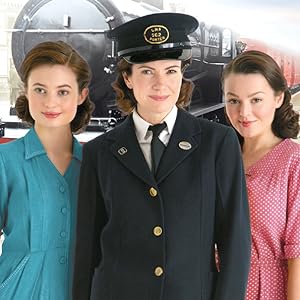 |
Here are some of the comments about Dot in reviews:
"...she comes across as a motherly figure looking out for everyone..."
"...Dot is the 'glue' in the centre of the group of friends: she is wise, her arms are always open for a hug and she is a sensitive but strong woman."
"...so kind-hearted but downtrodden by her family and her immense strength cried out to be put to better use."
"... a grandmother who stands for many women in the war, trying to combine housework, her family and a full time job."
* * * *
It's easy to see how much loved Dot is. She is full of common sense and good humour and her heart overflows with generosity. Readers also sympathise with her because of being married to Ratty Reg.
Wartime Britain was full of women like Dot - women who put in long hours doing war work and then went home to their domestic duties. There was a broad assumption at the time that domestic responsibilties would not be neglected, even though women didn't actually get any acknowledgement for keeping their homes running smoothly and looking after their families. It was just taken for granted that they would do this on top of doing their war work.
Dot is a staunch friend, a real looker-after, who keeps an eye on everyone around her and is always willing to lend a hand. She is good at tea and sympathy, but she isn’t just someone you go to for a shoulder to cry on. She is always practical in a crisis. No wonder Joan instinctively goes to Dot’s house after she leaves home.
Mind you, it wasn't Dot's intention to be the looker-after of the group when she started working on the railways. She felt she had more than enough of that role in her home life, thanks very much. But Dot's caring nature couldn't be denied and she did indeed become the mother-figure.
Above all else, Dot is a mum and a nan. Her two sons, Archie and Harry, mean the world to her. Dot would have loved to have more children but, sadly for her, it wasn’t to be. She could never imagine loving anyone as much as she loves her sons – until her grandchildren came along. Archie and Harry, Jimmy and Jenny, are the reasons Dot keeps going.
She longs for her sons to come home safely when the war is over. Meanwhile she does everything in her power to support Archie's wife Pammy and Harry's wife Sheila, while at the same time hiding her reservations about them.
Her job as a parcels porter has provided Dot a fresh sense of her own identity. Yes, she is a proud housewife with a spotless front step, but having a job outside the home has instilled in her a new sense of self-worth, a realisation that, as deeply as family life matters, it is important to her to have something more. It’s her way of contributing to the war effort, but it has also given her a sense of quiet pride in herself as an individual as well as extending her personal life to include the railway friends she cares about so much.
Getting to Know Joan
Joan is a much-loved character in the series – so what is it about her that appeals to readers?
Here are some of the comments made about her in reviews from the early books:
“…kind-hearted Joan… I loved the relationship between her and her sister…”
"She is held back by her ultra-strict upbringing… How I wish she could break free of Gran!”
“Joan seems to be hiding something, even as her storyline and her personality take shape.”
* * * *
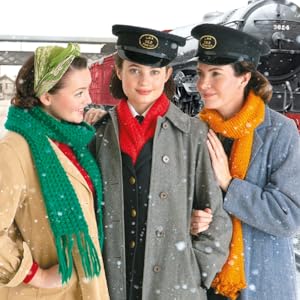
I’ve got to be careful how much I say here, because I mustn’t give away any spoilers – in fact, that’s why I chose to quote from reviews of the first three books in the series (The Railway Girls, Secrets of the Railway Girls and The Railway Girls in Love), in all of which Joan is one of the viewpoint characters.
Joan has had a tough upbringing. She and her sister were brought up by their grandmother, a stern, judgemental woman. As far as Gran is concerned, Joan is very much the second-best granddaughter. Even so, Joan feels no jealousy or resentment towards Letitia. The two sisters truly love one another and provide each other with friendship and emotional support. Joan admires her clever sister, whose aptitude for maths has gained her a special wartime job.
H
Joan’s first job on the railways is as a clerk in an office – much to her disappointment. She so wanted to be given a role on a station – ticket-collector or porter or announcer – or on a train – but she ended up as a clerk. Worse, though, she has to cope with having a dirty old man as her boss, something that brings Dot and Cordelia together as friends when they sort out this nasty problem for her. It gave me great satisfaction to write that particular scene!
As a volunteer first aider, taking care of the injured during air raids, Joan starts to grow as a person and her innate courage begins to show itself. Joan doesn’t just have physical courage – she has moral courage too, and this is tested to the limit by that mention of ‘hiding something’ that appeared in the review snippet quoted above. Even she has no idea of just how far she will have to go to protect her family when the past comes back to haunt them.
Joan is an important part of the Railway girls’ group, so why do the others value her? They admire the quiet courage that sees her cope with personal tragedy and they are delighted to see the happiness she eventually finds in her personal life, a happiness they feel she very much deserves. She is a staunch friend too – as Margaret in particular can testify. And while she has a stubborn streak, she will always dig deep into her thoughts and feelings and do what she knows to be right.
h
* * * *
Books in which Joan is a viewpoint character:
 |
 |
 |
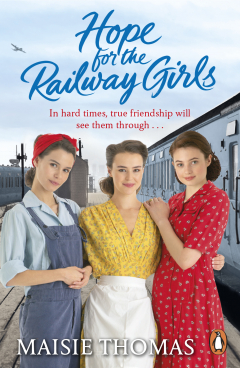 |
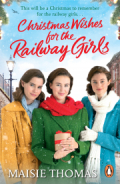 |
Mrs Cooper
Everyone's Favourite Landlady
Would you like to know the truth about Mrs Cooper? She was only ever supposed to have a brief walk-on part in The Railway Girls, but I liked her so much that I wanted to see more of her and get to know her better.
Mrs Cooper is typical of many people in wartime who experienced shattering bereavements but had no time to grieve before they were back at work, back in the long shopping queues, back in the air raid shelters when the siren sounded. Mrs Cooper lost her husband early in the war when he was run over in the blackout. The blackout itself was nothing new to people old enough to remember the Great War, but the major difference second time round was that there were now many more motor vehicles on the roads. Mr Cooper died in October 1939 and when Joan first met Lizzie in February 1940, Lizzie and her mum were just getting to grips with life without him.
Then, less than a year after losing her husband, Mrs Cooper’s darling Lizzie lost her life in an air raid – which was the point where Mrs Cooper entered the pages of the story in person. Before that, she was a background character, who was talked about frequently by Lizzie and it was obvious that the two of them were close and that Mrs Cooper was a devoted mother. Losing Lizzie made Mrs Cooper feel that the light had gone out in her life, but she plodded on, the same way that everyone in that situation had to.
So what was it about her that me like her so much that I wanted her to be a regular character in the series? I suppose it was her courage – her simple, unassuming courage in the face of this appalling bereavement – a courage that so many people must have shown in those dark days of wartime. Her common sense, too, is very appealing, as is her awareness that, as difficult as things may be for her, others face the same personal difficulties and the best way, the only way to cope is to knuckle down and get on with life and do the best you can.
No matter how bad she feels inside, Mrs Cooper always keeps a caring eye on others and she would be the first to tell you that this is how she keeps her sanity as she faces life without Lizzie. Knowing this, Dot came up with the ingenious idea of asking her to offer a home to Mrs Grayson when Mr Grayson and Floozy were all set to take over Mrs Grayson’s home; and a little later, Mrs Cooper offered the same warm hospitality to Joan, accepting Joan into her little household with a caring heart and an open mind that were completely the opposite of the rigid, judgemental atmosphere in which Joan had grown up with Gran.
After that, thanks to the Luftwaffe and Cordelia’s splendid idea, came the move to Wilton Close and I can’t begin to tell you how happy that made me. To have some of my characters living together is perfect – and what could be better than having dear Mrs Cooper to take care of them and watch over them?
Colette
a character who struck a chord
Warning: contains an important spoiler
One feature of being an author is that you have no idea of the circumstances in which your book will be read. For example, I heard from one reader who told me that she started reading the Railway Girls series because of losing her nana, who had been a lover of sagas. On Nana’s bookshelf were the early Railway Girls books and her granddaughter started reading them so as to feel close to her darling nana. After a while, the characters crept into her heart and she found herself reading the stories not just for Nana’s sake but also because she was eager to find out what happened next. I was very touched to hear this, and I’m sure you feel the same.
When Colette first became a viewpoint character back in book 4, Christmas with the Railway Girls, I soon found that her plot had struck a deeply personal chord with many readers.
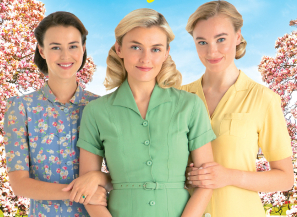
Colette is in the middle, between Alison (left) and Persephone
As her story has unfolded, I have heard from various women who have told me about their marriages to their own Tony and how they escaped. ‘Escaped’ is the word they all use. I have also heard from mothers whose daughters were married to a Tony and, as with Colette in the early days, no one else had any idea. I am honoured that these women feel that Colette’s story is true to life.
* * * *
Books in which Colette is a viewpoint character:
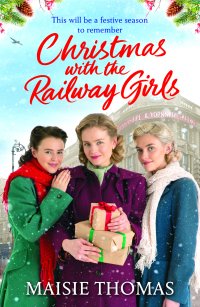 |
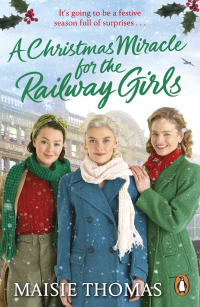 |
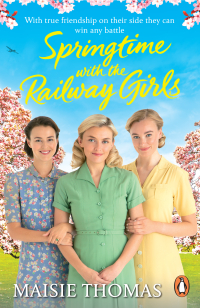 |
Readers Love The Railway Girls:
h
"

